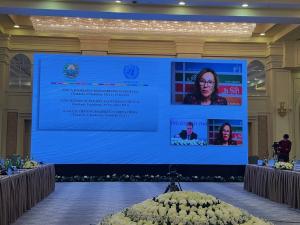SPECA countries have experienced the effects of climate change and the COVID-19 pandemic on key aspects of economic development and cooperation, with negative consequences for sustainable development. COVID-19 related restrictions and border closures caused serious disruption to supply chains and citizen mobility, while increasing costs and inequalities. Action is needed to address these new challenges to connectivity within the SPECA sub-region and to ensure a greener, inclusive, and increasingly circular post-pandemic recovery.
To find solutions, Azerbaijan, Kazakhstan, Kyrgyzstan, Tajikistan, Turkmenistan, and Uzbekistan – supported by UNECE and UNESCAP - met in Tashkent on 16-19 November for the Economic Forum and the Governing Council of the United Nations Special Programme for the Economic of Central Asia (SPECA) under the chairmanship of Uzbekistan.
SPECA in a unique platform that brings participating countries and the two regional commissions together for cooperation in areas including transport, trade, water management, energy, environmental protection, innovation and technology, gender and the SDGs. The countries declared their resolve to further build trust and come together to fight the crises facing the sub-region – from COVID-19 to rampant inequalities and climate change, noting the substantial role of the United Nations in this process.
SPECA was created in 1998, and since then has helped countries improve economic cooperation in the region. In Tashkent, SPECA participating countries agreed to renew the Programme and give it a new impetus. Specifically, the countries agreed to take first steps to create a SPECA permanent secretariat on a rotational basis, with the first location expected to be in Almaty, Kazakhstan. The also agreed to start working on creating a SPECA Fund to boost the Programme’s efficiency and jointly work on impact-oriented, practical regional projects and initiatives.
SPECA participating countries also reaffirmed the importance of the circular economy and the need to strengthen regional cooperation on climate change mitigation; the rational use of water and energy resources; alignment of the rapid development of trade, transport and connectivity, as well as the wider role of innovation to build a green, circular and inclusive economy after the pandemic.
SPECA objectives mirror the commitments of the Heads of State of the Central Asian countries expressed in their Joint Statement in Avaza, Turkmenistan on 6 August 2021, to advance sustainable development, connectivity, trade and cooperation in the region.
The participants in the SPECA Economic Forum, Governing Council and Working Group on Trade sessions highlighted the innovative solutions that UNECE and UNESCAP offer for sustainable transport, the implementation of the SPECA Principles of Sustainable Trade and SPECA Innovation Strategy for Sustainable Development, and projects to build back better for a greener, circular and inclusive economy after the pandemic. They showcased innovative tools for investment, and how the post-COVID-19 recovery would foster more equitable gender policies. The event finished by highlighting several projects and studies that UNECE has been implementing in Uzbekistan in 2021, which outline the positive impact of the country’s reforms. These reforms and renewed openness to the world bring clear benefits: Uzbekistan’s GDP is expected to increase by 6.1% in 2021, according to the October 2021 IMF World Economic Outlook – the highest pace amongst SPECA countries.
The SPECA country delegations confirmed the Programme’s contribution to renewed growth in the region and its position as a vehicle for the United Nations to advance the 2030 Agenda on Sustainable Development at a time when successive crises, from the COVID-19 pandemic and looming inequalities, as well as the complex security and humanitarian situation in the region constitute significant challenges.
Finally, there was a clear acknowledgment of the need to connect SPECA to other key regional cooperation platforms and formats, to intensify the engagement with the UN Country Teams in the region, and to ensure SPECA makes a tangible contribution to key regional and global processes, reflecting the unique potential and challenges of the region.
